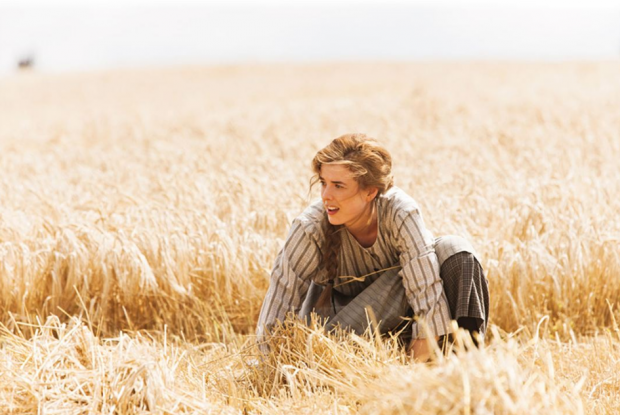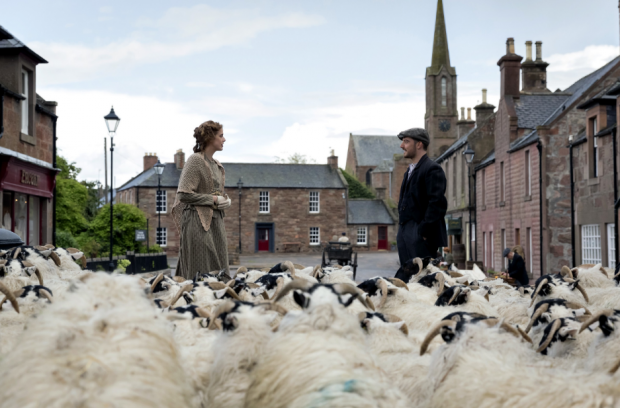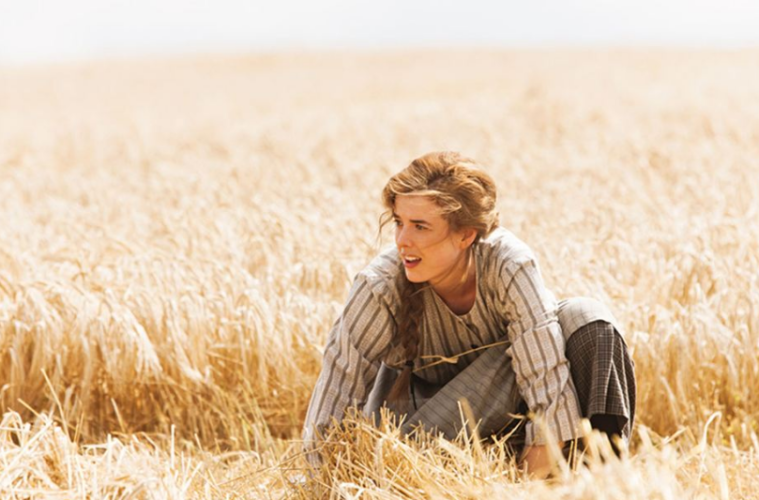
Terence Davies’ films deal with repressed desire, longing, and emotional pain that springs from the depths of his characters’ souls, and yet, in person, the great British auteur is undoubtedly the funniest person in the room. He is all smiles and jokes as we sit down to discuss his glorious Sunset Song, entering a limited release this week, and a retrospective of his work at the Museum of the Moving Image. It makes sense that he is joyful rather than somber, because it makes one feel a sort of relief knowing that levity was welcomed between takes on haunting dramas such as Distant Voices, Still Lives and The Deep Blue Sea. In Sunset Song, Davies takes on the first part of a trilogy written by Lewis Grassic Gibbons, in which we meet farm girl Chris Guthrie (a luminous Agyness Deyn) as she is forced to take on the reins of her life in pre-WWI Scotland.
The film explores themes that have been recurrent in Davies’ work, from abusive fathers to hopeless romances, but especially strong women who defeat the odds and pull through while living in a male-dominated society. It is also a beautiful anti-war film that highlights how much is lost even beyond the battlefield.
The Film Stage: You’re having this amazing retrospective at the Museum of the Moving Image. Does this make you mostly introspective, or is it just flattering and great?
Terence Davies: Of course I’m terribly flattered. I’m as vain as anybody else. When the films are finished they have very little to do with me. I feel quite alien from them. I certainly don’t watch them. During the production you see them again and again and again. So it was a really wonderful compliment from [the Museum of the Moving Image], but there is something in me that thinks, “Perhaps I’m the wrong Terence Davies. Perhaps I should be working in the glue factory and there’s someone else called Terence Davies who is a filmmaker.” I quite can’t believe it, to be truthful.
Are there any of your films you’re fonder of?
Not really. I think Neon Bible is not a success; I think the others are. I think you learn more from your failures than success — failure is always much more interesting than success. In Medieval times the man who played the Devil always got more than the man who played God, which tells you a lot. When I was growing up, I come from a working-class family; working-class people didn’t go to university. If you were reasonably intelligent, you went into an office, and if you were practically minded you had an apprenticeship. I don’t come from a class who normally did make films. There was that whole “kitchen sink drama” at the end of the ’50s and ’60s, but they were all directed by middle-class people who had no idea how ordinary people lived. They’re very dated now. I didn’t come from that background, so I had to learn a living.
I was a clerk in a shipping office, and then I was a bookkeeper in an accounting practice. I acted in the evening and wrote all this terrible stuff, that I thought was fabulous. I did it because I needed some emotional outlet. In my 20s I got very frightened, because my jobs were awful, I hated them. I was very good at being a bookkeeper, but I hated it. I saw what it did to people, being in offices, what it did to their souls. I went to drama school and film school and that saved me. But there’s still this part of me that doesn’t believe it.

It’s so interesting you said that, because one of the very first things that struck me watching Sunset Song is the title card in the opening credits, which reads “Lewis Grassic Gibbon’s Sunset Song,” rather than “Terence Davies’ Sunset Song.” Why did you do this?
I feel a great deal of warmth for the novel. It’s difficult to read, but a great novel. I thought, “For once he’s got to be the important one. He’s just got to be.” Everyone was very good about it, agents and that sort of thing. I asked them if we could have it as “Lewis Grassic Gibbon’s Sunset Song” and they all agreed, which was lovely. I feel exactly the same way about Emily Dickinson, who got no recognition in her lifetime. She liked to bake bread and only won second prize. I thought, “Why couldn’t she get prize, just once?” It’s not fair. Without Lewis writing that book there would be no film.
I suppose I’m drawn to people who have had it hard, like Bruckner is my great love — he only had one success. That was it. During his symphonies people would scream as they left the auditorium, by the end of the symphony there were more people in the orchestra than there were in the hall. Unbelievable! You read the reviews of the time by a man called Hanslick who was a vicious swine, saying such awful things about this glorious music. It was ahead of its time, like Emily was. Sunset Song is part of a trilogy, but I haven’t read the other two. When we shot in [Lewis’] parish church, I saw his little grave in the corner and I thought we needed to pay tribute to him. He just had to be number one for once.
That’s lovely. I thought it was your way of bringing back novelistic, epic feeling to cinema.
All great stories have two things in common: they’re simple, they’re not complicated, and they’re filmic. Look at all the great westerns: the story is dead simple, but what is done with it, that’s the magic. I wanted to do this well for my own sake, but I wanted it done properly for his.
I love how you introduce Chris Guthrie as someone who is kind of being born from the earth…
That was exactly what was intended.
It made me think of how, thanks to you, we have this filmic version of Chris Guthrie to join the likes of Scarlett O’Hara and Bathsheba Everdene, and this amazing legacy of women who are the Earth. Did you have films like Gone with the Wind in mind when you wrote Chris?
Oh, thank you! Not consciously. I was more influenced by women’s pictures from the 1950s, where the main character was a woman: All That Heaven Allows, Magnificent Obsession, Love is a Many-Splendored Thing. I grew up with those films. I loved Sunset Song, the novel, and the central character happened to be a 14-year-old girl. Obviously I also loved musicals, and they also influenced me. When I was seven I was taken to see Singin’ in the Rain, and what an introduction, for God’s sake! How could you not be knocked out by it? So they’re various sort of influences that you’re not aware of. They should come out of you refracted.
I always give a musical template. If you hear a trill in Mozart, it’s to end a cadence elegantly; if you hear a trill in Bruckner, it does not end a cadence — it’s usually some tremendous thing about to happen. They’re still trills. It’s the same with films. I grew up in an era where women were the central characters in musicals too: The Pajama Game, Love Me or Leave Me… they’re all there. Also what we had, which we don’t have anymore, were wonderful supporting actresses, like Eve Arden or Thelma Ritter. They were always so good. Eve Arden has this wonderful line in Cover Girl — she says about Rita Hayworth “that isn’t a girl, that’s a leaping thyroid” [Laughs] Isn’t that wonderful?

In Distant Voices, Still Lives, there’s this great moment when you use the theme from Love is a Many-Splendored Thing to show us both the people in the movie theater watching the film and two men plunging down from a scaffolding. It made me wonder if you’d ever been interested in making a full-blown musical. And, also, it made me think about our relationships with film: in that scene, you point out how just a few notes from that theme stir memories and feelings in people.
I was taken by my two sisters to see that film. We got the last three seats, and everyone was weeping. [Jennifer Jones] runs up the hill and it’s not William Holden — it’s a butterfly! Fabulous! I still watch it now, and I always start crying in the exact same place: they go to the beach and she swims over to her friends and it’s the first time we listen to the theme, and that’s it. I’m in tears for the rest of the film. The film has two very dignified performances, and they’re very succinct. When they meet, it’s two shots and you know they’re going to fall in love. It’s terrific. I remember that day, being taken to see it, as well as I remember when my sister Helen took me to see Young at Heart. I was 11 and fell in love with Doris Day absolutely, completely. You read the backstories about how horrible Frank Sinatra was and I don’t want to hear it. Although he does have the most wonderful sour lines, “These homes are the backbone of America. Where’s the spinning wheel?” [Laughs]
Would I like to make a musical? You bet I would! I wanted to make Follies. Stephen Sondheim wanted me to do it, but the other person who owned it said no. So it will never happen now. I’m too old, anyway.
I’m now angry at the world! Are you kidding?
[Laughs] It’s such a wonderful score.
That musical would be so in tune with your work! Who would you have cast in your version?
I wouldn’t know. The problem with that would be they would want big names, and I’m afraid I find a lot of them really rather dull. I think it’s obscene for someone to be paid $20 million. Nobody in the world is worth that kind of money. You’d be forced to. Once you go to Hollywood that machine takes you over. You don’t overtake it. Some little guy from Britain is not going to change it at all. I don’t think I could work there. I’d want to cast people who I feel are right for it, regardless of who they are, even complete unknowns. You can’t do that here. The bigger the budget, the bigger the interference. Life’s too short, quite honestly. I still love the score, though! It gives me immense joy!
Following the theme of music and sound in particular, I find it so interesting that you decided to make a radio play in the mid-2000s, at a time when most people would’ve had no interest in doing anything like that. In your work you’re constantly reminding us of the great eras of entertainment.
But also, it wasn’t like it is now. There was only the radio or you went to the pictures. Men went to football matches on a Saturday afternoon. That’s the way it was. Going to the pictures was wonderful, and radio was great, too. We had something called Family Favorites for all the British soldiers around the world and their relatives would send record requests. I remember one particular Sunday, we’d just got back from church, my mother was making breakfast and she switched Family Favorites on. All the windows were open and it was Jo Stafford singing “See the Pyramids Along the Nile.” I remember thinking, “Isn’t this perfect?” Every single window was open.
People did listen to the same programs. There were wonderful comedy programs, and looking back, it’s unbelievable, the things they got away with. In one sketch, there were basically two gay men, two chorus boys called Julian and Sandy, they were absolutely outrageous. “I thought of going abroad, how about Malaga?” The other says, “Don’t go to Malaga.” He asks, “You got stung in Malaga, didn’t you, Jules?” and he replies, “The Portuguese man of war said I didn’t recognize the uniform.” [Laughs] Isn’t that lovely?

It is. Going back to images, can you talk about the vision of Scotland that you had in mind for Sunset Song? Those green fields are astounding.
We had to have landscapes because they’re another character in the book. We had to go to New Zealand because we had to be sure we’d have sunshine. In Scotland, it rains for four days, then the sun shines for four hours and that’s it. We needed to have seasons, so in Scotland we had to push and shoot things that weren’t grey and miserable. The cinematographer was very good about it, and got it in a few hours. We needed the seasons to seem to be changing. It’s sensual. In Britain, we live in a temperate climate, but on hot summers you feel the air is lazy and there’s this wonderful, hazy sunshine. It was important for us to get this.
I also needed to get some poetry. People don’t walk through their crops, but I said I wanted the whole village to walk through the crop and we see them walking towards a church where they want hope and grace — but the preacher tells them to go shoot people, which is appalling. But that sequence goes back to when I was 18: on a Sunday night on the radio, there used to be a program that did classical songs with popular bands. There was a Glasgow choir called the Glasgow Orpheus Choir. They were amateurs but were started by an undertaker. I never forgot them and, when I wrote the script, I knew that had to be there.
In an interview you said that you thought despair was worse than any other pain, and I wondered if you’d seen yourself in the struggles of Chris in particular. Especially because you’ve mentioned that you have often picked yourself up and started over.
I think when you write it you need to sympathize with all the characters and feel they’re all true. Obviously the main character you do identify with. I think I’m able to empathize, in a way, with them. I know what they would say and what they wouldn’t say. In the case of Chris, her poetic side is all in voiceover: it was not practical; it was poetic. You have to feel every character, no matter how small they are. There you can only listen to your inner ear, and then, when I write dialogue, I say it out-loud. One occasion somebody said to me, “I don’t think I can say that in a single breath,” and I said, “You can, actually, because I did.”
I know that you don’t watch a lot of TV, but did Sex and the City have any influence in you casting Cynthia Nixon as Emily Dickinson?
No. I saw her for a film we didn’t get the money for, and I liked her very much. I never forgot her and, when we were starting the script, she kept coming into my mind. Anyway, we went to Mount Holyoke and they have the only photograph of Emily at age 17. My producer superimposed Cynthia Nixon’s face on her and she looked like her, even the long neck. I knew she was right. She stayed with it for two years. She was an absolute trooper. She gives the most breathtaking performance. She is Emily.

Sunset Song enters a limited release on Friday, May 13.

